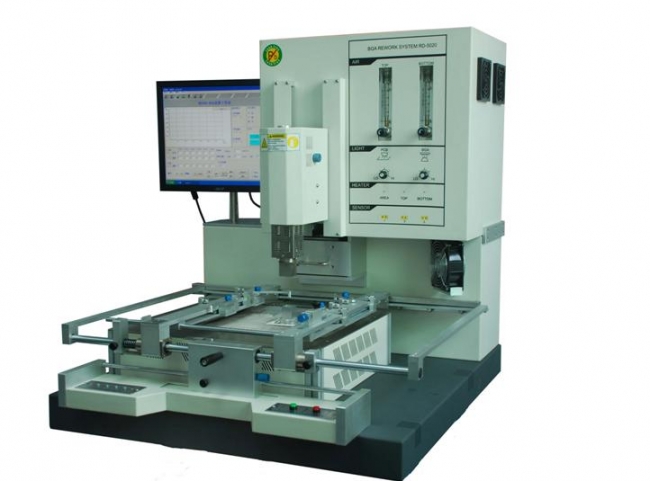Product Knowledge
- 2011-06-04 23:24:30
-

Lead Free Rework
Successful rework and PCB assembly methods have been developed with lead-free solders for all types of components. During the transition period to lead-free manufacturing rework practices have to be developed that deal with the issues related to handling, reworking, tracking and inspecting lead free PCB assemblies.

Example 0603 Resistor Soldered Using SAC lead-free alloy.
Lead-free solder rework is different than Sn63 solders as the lead-free solder alloys typically do not wet or wick as easily.

Example J-Lead Soldered Using SAC lead-free alloy.
Successful rework methods have been developed with lead-free solders
(including Sn/Ag/Cu or Sn/Ag alloys) including components removal/replacement,
jumper wires, trace and pad repairs and BGAs. Most of your existing rework equipment
for Sn63-based alloys can still be used for the lead-free solder. The soldering
parameters must be adjusted to accommodate the higher melting temperature and lesser
wettability of the lead-free solder. Studies have shown that reliable lead-free solder
joints, with proper grain structures and intermetallic formation, can be produced
using appropriate rework processes.

Example Gull Wing Lead Soldered Using SAC lead-free alloy.
Care must be taken to minimize any potential negative impact of the rework process
on the reliability of the solder interconnects, the components and the PCB. As the
soldering temperature increases, the coefficient of thermal expansion (CTE) mismatch
between the laminate material, the glass fiber and copper will exert greater stresses
on the copper, potentially causing failures by cracking of the copper traces or plated
vias. The propensity of the rework operation to cause this cracking is a function of
variables such as the PCB layer count and thickness, the laminate material, the rework
temperature profile, the copper distribution, the via geometry as well as others.
Alternative higher glass transition temperature, lower coefficient of thermal expansion
laminate materials may need to be specified for lead-free soldering. Higher rework
processing temperatures (approximately 30-40癈 higher) may impact other components
that are close to their melting or softening points such as connectors, batteries
and labels.
The issue of "component mixing" warrants special concern, especially during the
transition period. Preliminary studies on the impact of lead in lead-free solder
on long-term reliability indicate that the impact varies with the amount of lead
in the solder joint, and the impact may be the greatest when the amount of lead
is within some intermediate range because of the formation of segregated phases
(e.g., coarse lead grains) in the last-to-solidify interdendritic tin grain boundaries,
where cracks may initiate and propagate under cyclic loading. For example, it has been
shown that 2 to 5 percent lead can be detrimental to the fatigue life of lead-free
solder, but it probably is no worse than the Sn63 solder. For example, if a PCB
fabricated with Sn63 is to be repaired with lead-free solder, from the solder point
of view, the reliability of mixed lead-free solder and Sn/Pb solder will likely not
be inferior to the Sn63 solder. However, the temperature impact on the components would
be a concern. On the other hand, repairing a lead-free soldered board with Sn63 solder
would create solder joints that are not as reliable as the lead-free solder joints on
the rest of the board.
In terms of logistics, during the transition period it is key that solder irons and
materials (wirecore solder, flux gels, etc.) for lead-free soldering be clearly
labeled. Reviewing the JEDEC lead free PCB assembly and component identification
guidelines will be required in order to properly mark and identify the materials.
Operators must be trained in lead-free rework processes and most importantly inspection.
A good review of the IPCA610-D revision will be in required as part of this training.
- [Return Home] [Print] [Go Back]
Categories
- Lead-free Solering Iron
- Automatic Tin-feeding System
- Lead-free Soldering Tip
- SMT/SMD Rework stations
- Lead-free Soldering Station
- Hot Air Gun/Blower
- Hot Melt Adhesive Gun
- Lead-free Soldering Pot
- Micro-computer Hot Plate
- Fume Absorber and Purifier
- Soldering Accessory
- Electric &Pneumatic Screwdrivers
- Electronic Component Machine
- Microscopes
- Microscope Light
- Magnifying Lamp
- Industrial Camera
- ESD Products
- Cleanroom products
- Industrial tape
- Static control instrument
- BGA Rework Station
- electronic component
Search
Contact Us
Contact Person:
Marketing DepartmentTel:
86-755-36913086 / 28761680Fax:
86-755-33616323Email:
marketing@hksolder.com-






